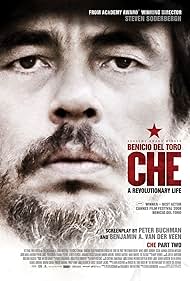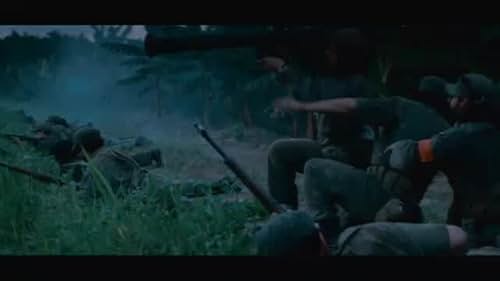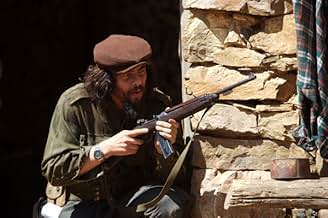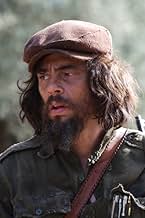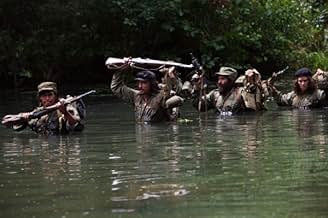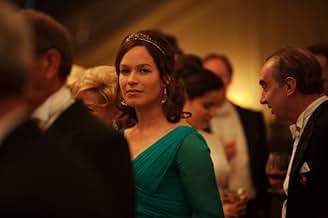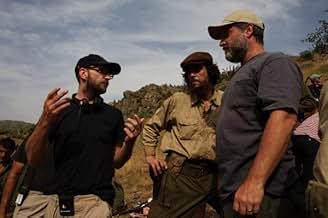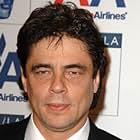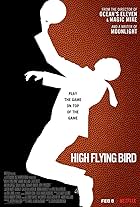Dopo la rivoluzione cubana, il Che è all'apice della sua fama e del suo potere. Poi improvvisamente sparisce, e ricompare in incognito in Bolivia, dove organizza un piccolo gruppo di compagn... Leggi tuttoDopo la rivoluzione cubana, il Che è all'apice della sua fama e del suo potere. Poi improvvisamente sparisce, e ricompare in incognito in Bolivia, dove organizza un piccolo gruppo di compagni cubani e reclute boliviane destinati a dare inizio alla grande rivoluzione latino-americ... Leggi tuttoDopo la rivoluzione cubana, il Che è all'apice della sua fama e del suo potere. Poi improvvisamente sparisce, e ricompare in incognito in Bolivia, dove organizza un piccolo gruppo di compagni cubani e reclute boliviane destinati a dare inizio alla grande rivoluzione latino-americana.
- Premi
- 2 vittorie e 7 candidature
- Fidel Castro
- (as Demian Bichir)
Trama
Lo sapevi?
- QuizWas the first feature-length movie to be shot with the Red One Digital Camera, as well as the first mainstream film to be shot in the 4K resolution. (Part One was also shot with this camera, but Part Two was shot first so Benicio Del Toro could gradually regain the weight he lost for this film)
- BlooperAt his execution, Che was shot a total of nine times, not three as shown in the movie.
- Citazioni
Ernesto Che Guevara: To survive here, to win... you have to live as if you've already died.
- Colonne sonoreBalderrama
Lyrics by Manuel José Castilla
Music by Gustavo Leguizamon
Performed by Mercedes Sosa
Courtesy of Universal Music
Copyright (c) by Lagos Editorial (Warner/Chappell Music Argentina)
While the movie's tone in some regards does stray off and differ quite drastically from Part One however, there still remains that same documented approach taken a month ago that avoids melodrama and fabrication as much as possible. This somewhat distant, cold approach to telling Che's story and struggle will no doubt turn some viewers off; indeed, I still remain reserved about whether or not the feature itself should have been named after one manif anything, the entirety of Che, taken as a whole, delivers a tale that goes beyond mere biography and instead documents a man's struggle alongside those who helped carry him along the way. By no means does Soderbergh try to paint a humanistic portrait here akin to what Hirschbiegel did with Der Untergang half a decade ago (excuse the ironic contrast); Che is a slow moving, reserved and meditative approach to telling a history lesson that just happens to be narrated by the one man who arguably- conducted the whole thing.
Yet by moving from the lush green landscapes of Cuba and retreating to the bleak, decaying backdrop of Bolivia for Part Two, the story does inevitably take on a distinctly contrasting tone that doesn't feel too disjointed from its predecessor, but does enough to give it its own reference points. Here, the basic structure of Part One is echoed backthere's the initial struggle, the battles, the fallen comrades and the recruiting of those to replace them, all the while we see some glimpses of the man behind the movement. Yet, as anyone with the vaguest idea of the actual history behind the feature will know, Part Two is destined to end on a much more underwhelming, and disquieting note. This difference, in combination with the similarities to Part One, make a compelling and memorable whole; by all means, both could be digested one their own (and kudos to Soderbergh for achieving as such) and enjoyed as they are, but taken as one statement, Che delivers exactly what it sets out to achieve.
Indeed, everything that made Part One the treat that it was one month prior is still evident here from the subtle yet engrossing performances from the central cast to the slow building, realistically structured combat scenesthe drama inherent to the characters on screen is just as vague and indiscernible, but with a feature such as this, Part Two once again proves that avoiding such elements don't necessarily hurt a film when there is enough plot and reflection on other elements to keep the viewer engaged. In fact, upon writing this review I was at odds as to whether or not to simply add a paragraph or two to my initial review for Part One, and title the review as a whole, yet I felt that to do so would only serve to disillusion those who may sit down to watch the entirety of both films consecutively.
With that said, I cannot rightfully decree whether or not Che holds up to the task of engaging an audience for its sprawling four hour plus runtime, but upon viewing both segments I can at least attest to each part's ability to do just that. With a reflective, intricate screenplay combined with endlessly mesmerising photography and nuanced performances that do justice to the movie's characters without drawing attention to themselves, Che Part Two is every bit as compelling and rewarding as its predecessor, but this time with a tragic but uplifting, reaffirming conclusion fit for the history pages of film.
- A review by Jamie Robert Ward (http://www.invocus.net)
I più visti
Dettagli
Botteghino
- Budget
- 40.000.000 USD (previsto)
- Lordo Stati Uniti e Canada
- 748.555 USD
- Fine settimana di apertura Stati Uniti e Canada
- 61.070 USD
- 14 dic 2008
- Lordo in tutto il mondo
- 8.638.163 USD
- Tempo di esecuzione2 ore 15 minuti
- Colore
- Mix di suoni
- Proporzioni
- 1.85 : 1
Contribuisci a questa pagina

